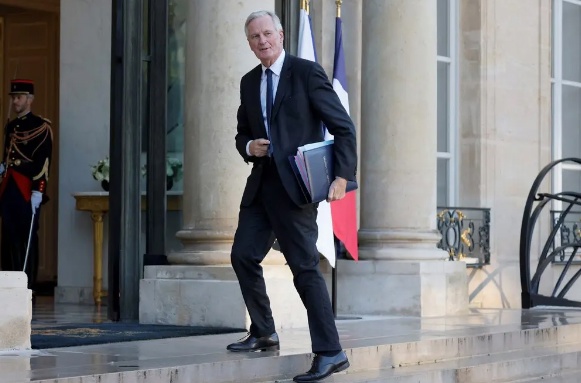France is set to announce its initial course of shock therapy to tackle its growing deficit, aimed at reassuring sceptical bond investors and overcoming strong opposition in a divided parliament, French media reported.
France’s new Prime Minister Michel Barnier on Thursday presented a deficit-cutting budget to his cabinet before presenting it to a hostile parliament in what is seen as a major test of his government’s resilience.
Barnier, who has only been in office since last month after an inconclusive general election, survived a no-confidence vote earlier this week by left-wing MPs who believe they should have been appointed by President Emmanuel Macron rather than the Conservative prime minister.
But while Barnier easily handled the opposition in that vote, he remains hostage to the possibility that left-wing and far-right deputies will unite in the future to force the government to resign in another vote of no confidence.
The annual budget debate in France is often the occasion for a vote of no confidence, and Barnier’s plan has provoked intense opposition even before the details were known. Manuel Bompard, a lawmaker for the hard-left LFI party, said:
“This is the most violent austerity plan that this country has ever seen. It will cause French people to suffer.”
Challenging tasks for Barnier
The head of the French cabinet has a difficult task: not to cause discontent and find an extra 60bn euros. This is the amount that is not enough to bring the budget deficit to acceptable values. 20bn is planned to be taken from the wealthiest parts of the economy – the 0.3% of the richest households and companies whose annual profits exceed €1bn.
The tax increase will not last longer than two years, Barnier assures. He needs to convince not only parliamentarians and citizens, but also investors in the effectiveness of the measures: their problems with the budget can not cause enthusiasm and a greater desire to invest in the French economy.
Another 20 billion euros is planned to be obtained by cutting funding for ministries and departments. The remaining 20 billion euros will fall on municipalities and the social sphere, where budgetary injections will also be reduced.
Controversial initiatives for France
Another measure will be to increase taxes on cars with high petrol consumption. The car lobby called the move “pseudo-environmentalism,” accusing the government of trying to get as much tax as possible under the guise of fighting for the environment.
But this step is not the most unpleasant of all. The most controversial may be the initiative to freeze the indexation of pensions: Barnier wants to raise pensions in line with inflation in July instead of January. And this is for the sake of receiving 4 billion euros. The same amount of money Paris will receive from the reduction of benefits to businesses. And after all, the easing was given for a reason, but with an important purpose: to provide employment.
All this will be just the beginning of the financial “purgatory.” The fact is that the above-mentioned measures will bring the budget deficit to 5 per cent compared to the current 6.1 per cent. This is still far from the desired 3% mark, which is planned to be reached only by 2029.
The tax hikes are outrageous, if only because France’s budget is made up of almost half of tax collections. No other EU country has such figures.
The tax hike could end up simply being a relocation of wealthy residents. For example, one of the potential destinations for emigration could be Dubai, where the tax system is much more lenient.
Barrage of criticism
The budget has been criticised from all sides. Gabriel Attal, a former PM and leader of the centrist group in the National Assembly, said that raising taxes on companies was a departure from the pro-business policies that Mr. Macron promoted during his seven-year presidency. There are “too many taxes” in the plan, Mr. Attal, who presented a counter-proposal to Mr. Barnier that would instead further cut public spending, said.
But French finance officials say the tax hike is a drop in the ocean compared to the €100bn the government has spent in recent years to help French businesses stay afloat during the energy crisis. Mr. Armand, the economy minister, said:
“We’re far from asking them for an effort of the same order of magnitude as that which was provided by the state.”
France’s main financial watchdog warned on Thursday that the budget could damage the French economy by cutting growth next year from the already low 1.1 per cent projected by the government.
Nevertheless, France’s central bank governor, François Villeroy de Galhau, said the country urgently needed to regain control of its public accounts. He said:
“We’re like a family that’s been living beyond its means.”
